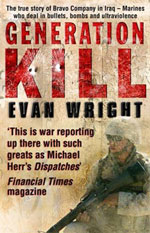 “Generation Kill” is among the many superb books written by journalists about the Iraq and Afghan wars. Dexter Filkins, David Finkel, Sebastian Junger, John Krakauer, Michael Yon…and now Evan Wright. Though actually, Wright came first, publishing this book in 2004.
“Generation Kill” is among the many superb books written by journalists about the Iraq and Afghan wars. Dexter Filkins, David Finkel, Sebastian Junger, John Krakauer, Michael Yon…and now Evan Wright. Though actually, Wright came first, publishing this book in 2004.
Evan Wright, a Rolling Stone contributing editor, was embedded with the First Recon Marines during the 2003 invasion. As soon as the invasion started, they were at the forefront, plunging deep into Iraqi territory. The book won a national magazine award, and was adapted as an HBO miniseries.
Wright specialized in writing about youth subcultures–radical environmentalists, skateboarders, criminals. He saw the military as another youth subculture. He pitched the idea to his Rolling Stone editor, and found himself in a combat zone for the first time. And whereas many reporters experience one firefight and then go home to tell their story and act like experts, Wright endured 17 firefights, including one during which 26 bullets slammed into his Humvee door.

Evan Wright
“Generation Kill” definitely has the feel of Rolling Stone. The tone and style would make the legendary Stone writer Hunter S. Thompson proud (though Thompson would have been a bit more irreverent).
Whereas Sebastian Junger’s book “War” was focused in one place, “Generation Kill’ is pretty much a frantic, careening joyride through southern Iraq. It reminded me a bit of Kelly’s Heroes.
Take a bunch of young men, train them to use very destructive weapons, get them hyped up, and then send them out to meet the enemy. That’s a recipe for mayhem. And Wright records plenty of mayhem. These young soldiers, highly trained and eager to use their expensive weapons, shoot up the countryside, including a number of innocent bystanders. There are a couple incidents which could easily be labeled as war crimes, and the targeting of civilians is disturbing, though the “fog of war” justifies a good deal of it.
“However admirable the military’s attempts are to create Rules of Engagement, they basically create an illusion of moral order where there is none. The Marines operate in chaos. It doesn’t matter if a Marine is following orders and ROE, or disregarding them. The fact is, as soon as a Marine pulls the trigger on his rifle, he’s on his own. He’s entered a game of moral chance. When it’s over, he’s as likely to go down as a hero or as a baby killer.”
Wright does a good job of presenting surreal images of war.
“Corpses of the Iraqi attackers who fell in the road have been run over repeatedly by tracked vehicles….There’s a man in the road with no head, and a dead little girl, too, about three or four, lying on her back. She’s wearing a dress and has no legs….
“You pass three dead men by the road, surrounded by weapons, then shepherds in the field behind them waving and smiling. There’s a car with a dead woman shot in the backseat–no hint why Marines or helicopters shot her.”
Wright makes regular pop-culture references. Of one harrowing drive through a hostile Iraqi town, with everyone emerging unscathed, he wrote, “The whole engagement was like one of those cheesy action movies in which the bad guys fire thousands of rounds that all narrowly miss the hero.”
He throws out a lot of interesting tidbits, like the fact that while the Marines generally use the metric system, snipers still do everything in yards. And then there are wonderful lines and passages like these:
- “There’s a definite sense of exhilaration every time there’s an explosion and you’re still there afterward.”
- “US military doctrine is pretty straightforward in situations like this: if there even appears to be an imminent threat, bomb the crap out of it.”
- “One thing you can say about intense weapons fire, it sounds like it ought to. It’s an extremely angry noise.”
- “In a pitched firefight, denial serves one very well. I simply refuse to believe anyone’s going to shoot me.”
- “In addition to the embarrassing loss of bodily control that 25 percent of all soldiers experience, other symptoms include time dilation, a sense of time slowing down or speeding up; vividness, a starkly heightened awareness of detail; random thoughts, the mind fixating on unimportant sequences; memory loss; and, of course, your basic feelings of sheer terror.”
Wright updated the book in 2008 by tracking down many of the soldiers and letting us know what they’re doing now. Some re-upped for additional tours. He tells their stories, and captures their reflections on the early days of the invasion, in the “Afterword.” This may have been my favorite part. Having become so acquainted with these soldiers, I was delighted to learn what became of them. The book had been out for several years, and the Marines apparently felt Wright captured what happened pretty well. At least, they were open to talking to him again.
Like Eric Kocher, a prominent character in the book. He served four deployments in Iraq, but called it quits in 2007. “I’m just tired of seeing fifty-dollar bombs destroy two million dollar vehicles and kill Marines every day.”
Wright uses the real names of soldiers, except for several officers who are clearly incompetent and, in one case, a little nuts. For them, he goes by their nicknames, two of them being Captain America and Encino Man. I kind of appreciated that.
This is a superb book. I’m not sure that I would recommend it above some of the others I’ve read, but it definitely ranks among the best books about our present wars written thus far.





